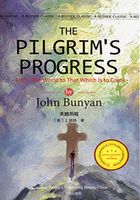The Brooch
I
THE TELEPHONE waked him. He waked already hurrying, fumbling in the dark for robe and slippers, because he knew before waking that the bed beside his own was still empty, and the instrument was downstairs just opposite the door beyond which his mother had lain propped upright in bed for five years, and he knew on waking that he would be too late because she would already have heard it, just as she heard everything that happened at any hour in the house.
She was a widow, he the only child. When he went away to college she went with him;she kept a house in Charlottesville, Virginia, for four years while he graduated.She was the daughter of a well-to-do merchant.Her husband had been a travelling man who came one summer to the town with letters of introduction:one to a minister, the other to her father.Three months later the travelling man and the daughter were married.His name was Boyd.He resigned his position within the year and moved into his wife's house and spent his days sitting in front of the hotel with the lawyers and the cotton-planters—a dark man with a gallant swaggering way of removing his hat to ladies.In the second year, the son was born.Six months later, Boyd departed.He just went away, leaving a note to his wife in which he told her that he could no longer bear to lie in bed at night and watch her rolling onto empty spools the string saved from parcels from the stores.His wife never heard of him again, though she refused to let her father have the marriage annulled and change the son's name.
Then the merchant died, leaving all his property to the daughter and the grandson who, though he, had been out of Fauntleroy suits since he was seven or eight, at twelve wore even on weekdays clothes which made him look not like a child but like a midget;he probably could not have long associated with other children even if his mother had let him. In due time the mother found a boys'school where the boy could wear a round jacket and a man's hard hat with impunity, though by the time the two of them removed to Charlottesville for these next four years, the son did not look like a midget.He looked now like a character out of Dante—a man a little slighter than his father but with something of his father's dark handsomeness, who hurried with averted head, even when his mother was not with him, past the young girls on the streets not only of Charlottesville but of the little lost Mississippi hamlet to which they presently returned, with an expression of face like the young monks or angels in fifteenth-century allegories.Then his mother had her stroke, and presently the mother's friends brought to her bed reports of almost exactly the sort of girl which perhaps even the mother might have expected the son to become not only involved with but to marry.
Her name was Amy, daughter of a railroad conductor who had been killed in a wreck. She lived now with an aunt who kept a boarding-house—a vivid, daring girl whose later reputation was due more to folly and the caste handicap of the little Southern town than to badness and which at the last was doubtless more smoke than fire;whose name, though she always had invitations to the more public dances, was a light word, especially among the older women, daughters of decaying old houses like this in which her future husband had been born.
So presently the son had acquired some skill in entering the house and passing the door beyond which his mother lay propped in bed, and mounting the stairs in the dark to his own room. But one night he failed to do so.When he entered the house the transom above his mother's door was dark, as usual, and even if it had not been he could not have known that this was the afternoon on which the mother's friends had called and told her about Amy, and that his mother had lain for five hours, propped bolt upright, in the darkness, watching the invisible door.He entered quietly as usual, his shoes in his hand, yet he had not even closed the front door when she called his name.Her voice was not raised.She called his name once:
"Howard."
He opened the door. As he did so the lamp beside her bed came on.It sat on a table beside the bed;beside it sat a clock with a dead face;to stop it had been the first act of his mother when she could move her hands two years ago.He approached the bed from which she watched him—a thick woman with a face the color of tallow and dark eyes apparently both pupil-less and iris-less beneath perfectly white hair."What?"he said."Are you sick?"
"Come closer,"she said. He came nearer.They looked at one another.Then he seemed to know;perhaps he had been expecting it.
"I know who's been talking to you,"he said."Those damned old buzzards."
"I'm glad to hear it's carrion,"she said."Now I can rest easy that you won't bring it into our house."
"Go on. Say, your house."
"Not necessary. Any house where a lady lives."They looked at one another in the steady lamp which possessed that stale glow of sickroom lights."You are a man.I don't reproach you.I am not even surprised.I just want to warn you before you make yourself ridiculous.Don't confuse the house with the stable."
"With the—Hah!"he said. He stepped back and jerked the door open with something of his father's swaggering theatricalism."With your permission,"he said.He did not close the door.She lay bolt upright on the pillows and looked into the dark hall and listened to him go to the telephone, call the girl, and ask her to marry him tomorrow.Then he reappeared at the door."With your permission,"he said again, with that swaggering reminiscence of his father, closing the door.After a while the mother turned the light off.It was daylight in the room then.
They were not married the next day, however."I'm scared to,"Amy said."I'm scared of your mother. What does she say about me?"
"I don't know. I never talk to her about you."
"You don't even tell her you love me?"
"What does it matter?Let's get married."
"And live there with her?"They looked at one another."Will you go to work, get us a house of our own?"
"What for?I have enough money. And it's a big house."
"Her house. Her money."
"It'll be mine—ours some day. Please."
"Come on. Let's try to dance again."This was in the parlor of the boarding-house, where she was trying to teach him to dance, but without success.The music meant nothing to him;the noise of it or perhaps the touch of her body destroyed what little co-ordination he could have had.But he took her to the Country Club dances;they were known to be engaged.Yet she still staid out dances with other men, in the parked cars about the dark lawn.He tried to argue with her about it, and about drinking.
"Sit out and drink with me, then,"he said.
"We're engaged. It's no fun with you."
"Yes,"he said, with the docility with which he accepted each refusal;then he stopped suddenly and faced her."What's no fun with me?"She fell back a little as he gripped her shoulder."What's no fun with me?"
"Oh,"she said."You're hurting me!"
"I know it. What's no fun with me?"
Then another couple came up and he let her go. Then an hour later, during an intermission, he dragged her, screaming and struggling, out of a dark car and across the dance floor, empty now and lined with chaperones like a theater audience, and drew out a chair and took her across his lap and spanked her.By daylight they had driven twenty miles to another town and were married.
That morning Amy called Mrs. Boyd"Mother"for the first and(except one, and that perhaps shocked out of her by surprise or perhaps by exultation)last time, though the same day Mrs.Boyd formally presented Amy with the brooch:an ancient, clumsy thing, yet valuable.Amy carried it back to their room, and he watched her stand looking at it, perfectly cold, perfectly inscrutable.Then she put it into a drawer.She held it over the open drawer with two fingers and released it and then drew the two fingers across her thigh.
"You will have to wear it sometimes,"Howard said.
"Oh, I will. I'll show my gratitude.Don't worry."Presently it seemed to him that she took pleasure in wearing it.That is, she began to wear it quite often.Then he realized that it was not pleasure but vindictive incongruity;she wore it for an entire week once on the bosom of a gingham house dress, an apron.But she always wore it where Mrs.Boyd would see it, always when she and Howard had dressed to go out and would stop in the mother's room to say good night.
They lived upstairs, where, a year later, their child was born. They took the child down for Mrs.Boyd to see it.She turned her head on the pillows and looked at the child once."Ah,"she said."I never saw Amy's father, that I know of.But then, I never travelled on a train a great deal."
"The old—the old—"Amy cried, shuddering and clinging to Howard."Why does she hate me so?What have I ever done to her?Let's move. You can work."
"No. She won't live always."
"Yes, she will. She'll live forever, just to hate me."
"No,"Howard said. In the next year the child died.Again Amy tried to get him to move.
"Anywhere. I won't care how we have to live."
"No. I can't leave her helpless on her back.You will have to start going out again.Dance.Then it won't be so bad."
"Yes,"she said, quieter."I'll have to. I can't stand this."
One said"you,"the other,"I."Neither of them said"we."So, on Saturday nights Amy would dress and Howard would put on scarf and overcoat, sometimes over his shirtsleeves, and they would descend the stairs and stop at Mrs. Boyd's door and then Howard would put Amy into the car and watch her drive away.Then he would re-enter the house and with his shoes in his hand return up the stairs, as he had used to do before they married, slipping past the lighted transom.Just before midnight, in the overcoat and scarf again, he would slip back down the stairs and past the still lighted transom and be waiting on the porch when Amy drove up.Then they would enter the house and look into Mrs.Boyd's room and say good night.
One night it was one o'clock before she returned. He had been waiting for an hour in slippers and pajamas on the porch;it was November.The transom above Mrs.Boyd's door was dark and they did not stop.
"Some jelly beans set the clock back,"she said. She did not look at him, dragging her clothes off, flinging the brooch along with her other jewelry onto the dressing table."I had hoped you wouldn't be fool enough to stand out there and wait for me."
"Maybe next time they set the clock back I won't."
She stopped, suddenly and perfectly still, looking at him over her shoulder."Do you mean that?"she said. He was not looking at her;he heard, felt, her approach and stand beside him.Then she touched his shoulder."Howard?"she said.He didn't move.Then she was clinging to him, flung onto his lap, crying wildly:"What's happening to us?"striking herself against him with a wild abandon:"What is it?What is it?"He held her quiet, though after they were each in their beds(they already had two of them)he heard and then felt her cross the intervening gap and fling herself against him again with that wild terrified abandon not of a woman but of a child in the dark, enveloping him, whispering:"You don't have to trust me, Howard!You can!You can!You don't have to!"
"Yes,"he said."I know. It's all right.It's all right."So after that, just before twelve, he would put on the overcoat and scarf, creep down the stairs and past the lighted transom, open and close the front door noisily, and then open his mother's door where the mother would be propped high on the pillows, the book open and face down on her knees.
"Back already?"Mrs. Boyd would say.
"Yes. Amy's gone on up.Do you want anything?"
"No. Good night."
"Good night."
Then he would go up and go to bed, and after a time(sometimes)to sleep. But before this sometimes, taking it sometimes into sleep with him, he would think, tell himself with that quiet and fatalistic pessimism of the impotent intelligent:But this cannot go on forever.Some night something is going to happen;she is going to catch Amy.And I know what she is going to do.But what am I going to do?He believed that he did know.That is, the top of his mind assured him that it knew, but he discounted this;the intelligence again:not to bury it, flee from it:just discounting it, the intelligence speaking out of the impotence:Because no man ever knows what he will do in any given situation, set of circumstances:the wise, others perhaps, drawing conclusions, but never himsetf.The next morning Amy would be in the other bed, and then, in the light of day, it would be gone.But now and then, even by daylight, it returned and he from the detachment of his cerebration contemplating his life, that faulty whole whose third the two of them had produced yet whose lack the two of them could not fill, telling himself, Yes.I know what she will do and I know what Amy will ask me to do and I know that I will not do that.But what will I do?but not for long, telling himself now that it had not happened so far, and that anyway it was six long days until Saturday:the impotence now, not even the intellect.
II
SO IT was that when he waked to the bell's shrilling he already knew that the bed beside his own was still empty, just as he knew that, no matter how quickly he reached the telephone, it would already be too late. He did not even wait for his slippers;he ran down the now icy stairs, seeing the transom above his mother's door come alight as he passed it and went to the phone and took the receiver down:"Oh, Howard, I'm so sorry—this is Martha Ross—so sorry to disturb you, but I knew that Amy would be anxious about it.I found it in the car, tell her, when we got back home."
"Yes,"he said."In the car."
"In our car. After she lost her switch key and we brought her home, to the corner.We tried to get her to come on home with us and have some ham and eggs, but she—"Then the voice died away.He held the cold receiver to his ear and heard the other end of the wire, the silence, fill with a sort of consternation like an in-drawn breath:something instinctive and feminine and self-protective.But the pause itself was hardly a pause;almost immediately the voice went on, though completely changed now, blank, smooth, reserved:"Amy's in bed, I suppose!"
"Yes. She's in bed."
"Oh. So sorry I bothered you, got you up.But I knew she would be anxious about it, since it was your mother's, the family piece.But of course, if she hasn't missed it yet, you won't need to bother her."The wire hummed, tense,"That I called or anything."The wire hummed."Hello.Howard?"
"No,"he said."I won't bother her tonight. You can call her in the morning."
"Yes, I will. So sorry I bothered you.I hope I didn't wake your mother."
He put the receiver back. He was cold.He could feel his bare toes curling back from the ice-like floor as he stood looking at the blank door beyond which his mother would be sitting, high-propped on the pillows, with her tallow face and dark inscrutable eyes and the hair which Amy said resembled weathered cotton, beside the clock whose hands she had stopped herself at ten minutes to four on the afternoon five years ago when she first moved again.When he opened the door his picture had been exact, almost to the position of the hands even.
"She is not in this house,"Mrs. Boyd said.
"Yes. She's in bed.You know when we came in.She just left one of her rings with Martha Ross tonight and Martha telephoned."
But apparently she had not even listened to him."So you swear she is in this house this minute."
"Yes. Of course she is.She's asleep, I tell you."
"Then send her down here to say good night to me."
"Nonsense. Of course I won't."
They looked at one another across the bed's footboard.
"You refuse?"
"Yes."
They looked at one another a moment longer. Then he began to turn away;he could feel her watching him."Then tell me something else.It was the brooch she lost."
He did not answer this either. He just looked at her again as he closed the door:the two of them curiously similar, mortal and implacable foes in the fierce close antipathy of blood.He went out.
He returned to the bedroom and turned on the light and found his slippers and went to the fire and put some coal on the embers and punched and prodded it into flame. The clock on the mantel said twenty minutes to one.Presently he had a fair blaze;he had quit shivering.He went back to bed and turned off the light, leaving only the firelight pulsing and gleaming on the furniture and among the phials and mirrors of the dressing table, and in the smaller mirror above his own chest of drawers, upon which sat the three silver photograph frames, the two larger ones containing himself and Amy, the smaller one between them empty.He just lay.He was not thinking at all.He had just thought once, quietly, So that's that.So now I suppose I will know, find out what I am going to do and then no more, not even thinking that again.
The house seemed still to be filled with the shrill sound of the telephone like a stubborn echo. Then he began to hear the clock on the mantel, reiterant, cold, not loud.He turned on the light and took up the book face down and open from the table beside his pillow, but he found that he could not keep his mind on the words for the sound which the clock made, so he rose and went to the mantel.The hands were now at half past two.He stopped the clock and turned its face to the wall and brought his book to the fire and found that he could now keep his mind on the words, the sense, reading on now untroubled by time.So he could not have said just when it was that he found he had ceased to read, had jerked his head up.He had heard no sound, yet he knew that Amy was in the house.He did not know how he knew:he just sat holding his breath, immobile, the peaceful book raised and motionless, waiting.Then he heard Amy say,"It's me, Mother."
She said"Mother"he thought, not moving yet. She called her"Mother"again.He moved now, putting the book carefully down, his place marked, but as he crossed the room he walked naturally, not trying to deaden his footsteps, to the door and opened it and saw Amy just emerging from Mrs.Boyd's room.She began to mount the stairs, walking naturally too, her hard heels sharp and unnaturally loud in the nightbound house.She must have stooped when Mother called her and put her slippers on again, he thought.She had not seen him yet, mounting steadily, her face in the dim hall light vague and petal-like against the collar of her fur coat, projecting already ahead of her to where he waited a sort of rosy and crystal fragrance of the frozen night out of which she had just emerged.Then she saw him at the head of the stairs.For just a second, an instant, she stopped dead still, though she was moving again before it could have been called pause, already speaking as she passed him where he stood aside, and entered the bedroom:"Is it very late?I was with the Rosses.They just let me out at the corner;I lost my car key out at the club.Maybe it was the car that waked her."
"No. She was already awake.It was the telephone."
She went on to the fire and spread her hands to it, still in her coat;she did not seem to have heard him, her face rosy in the firelight, her presence emanating that smell of cold, that frosty fragrance which had preceded her up the stairs:"I suppose so. Her light was already on.I knew as soon as I opened the front door that we were sunk.I hadn't even got in the house good when she said'Amy'and I said'It's me, Mother'and she said,'Come in here, please,'and there she was with those eyes that haven't got any edges to them and that hair that looks like somebody pulled it out of the middle of a last year's cotton bale, and she said,'Of course you understand that you will have to leave this house at once.Good night.'"
"Yes,"he said."She has been awake since about half past twelve. But there wasn't anything to do but insist that you were already in bed asleep and trust to luck."
"You mean, she hasn't been asleep at all?"
"No. It was the telephone, like I told you.About half past twelve."
With her hands still spread to the fire she glanced at him over her furred shoulder, her face rosy, her eyes at once bright and heavy, like a woman's eyes after pleasure, with a kind of inattentive conspiratorial commiseration."Telephone?Here?At half past twelve?What absolutely putrid—But no matter."She turned now, facing him, as if she had only been waiting until she became warm, the rich coat open upon the fragile glitter of her dress;there was a quality actually beautiful about her now—not of the face whose impeccable replica looks out from the covers of a thousand magazines each month, nor of the figure, the shape of deliberately epicene provocation into which the miles of celluloid film have constricted the female body of an entire race;but a quality completely female in the old eternal fashion, primitive, assured and ruthless as she approached him, already raising her arms."Yes!I say luck too!"she said, putting her arms around him, her upper body leaned back to look into his face, her own face triumphant, the smell now warm woman-odor where the frosty fragrance had thawed."She said at once, now. So we can go.You see?Do you understand?We can leave now.Give her the money, let her have it all.We won't care.You can find work;I won't care how and where we will have to live.You don't have to stay here now, with her now.She has—what do you call it?absolved you herself.Only I have lost the car key.But no matter:we can walk.Yes, walk;with nothing, taking nothing of hers, like we came here."
"Now?"he said."Tonight?"
"Yes!She said at once. So it will have to be tonight."
"No,"he said. That was all, no indication of which question he had answered, which denied.But then, he did not need to because she still held him;it was only the expression of her face that changed.It did not die yet nor even become terrified yet:it just became unbelieving, like a child's incredulity."You mean, you still won't go?You still won't leave her?That you would just take me to the hotel for tonight and that you will come back here tomorrow?Or do you mean you won't even stay at the hotel with me tonight?That you will take me there and leave me and then you—"She held him, staring at him;she began to say,"Wait, wait.There must be some reason, something—Wait,"she cried;"wait!You said, telephone.At half past twelve."She still stared at him, her hands hard, her pupils like pinpoints, her face ferocious."That's it.That's the reason.Who was it that telephoned here about me?Tell me!I defy you to!I will explain it.Tell me!"
"It was Martha Ross. She said she had just let you out at the corner!"
"She lied!"she cried at once, immediately, scarce waiting to hear the name."She lied!They did bring me home then but it was still early and so I decided to go on with them to their house and have some ham and eggs. So I called to Frank before he got turned around and I went with them.Frank will prove it!She lied!They just this minute put me out at the corner!"
She looked at him. They stared at one another for a full immobile moment.Then he said,"Then where is the brooch?"
"The brooch?"she said."What brooch?"But already he had seen her hand move upward beneath the coat;besides, he could see her face and watch it gape like that of a child which has lost its breath before she began to cry with a wild yet immobile abandon, so that she spoke through the weeping in the choked gasping of a child, with complete and despairing surrender:"Oh, Howard!I wouldn't have done that to you!I wouldn't have!I wouldn't have!"
"All right,"he said."Hush, now. Hush, Amy.She will hear you."
"All right. I'm trying to."But she still faced him with that wrung and curiously rigid face beneath its incredible flow of moisture, as though not the eyes but all the pores had sprung at once;now she too spoke directly out of thinking, without mention of subject or circumstance, nothing more of defiance or denial:"Would you have gone with me if you hadn't found out?"
"No. Not even then.I won't leave her.I will not, until she is dead.Or this house.I won't.I can't.I—"They looked at one another, she staring at him as if she saw reflected in his pupils not herself but the parchment-colored face below stairs—the piled dirty white hair, the fierce implacable eyes—her own image blanked out by something beyond mere blindness:by a quality determined, invincible, and crucified.
"Yes,"she said. From somewhere she produced a scrap of chiffon and began to dab at her eyes, delicately, even now by instinct careful of the streaked mascara."She beat us.She lay there in that bed and beat us."She turned and went to the closet and drew out an overnight bag and put the crystal objects from the dressing-table into it and opened a drawer."I can't take everything tonight.I will have to—"
He moved also;from the chest of drawers where the small empty photograph frame sat he took his wallet and removed the bills from it and returned and put the money into her hand."I don't think there is very much here. But you won't need money until tomorrow."
"Yes,"she said."You can send the rest of my things then, too."
"Yes,"he said. She folded and smoothed the notes in her fingers;she was not looking at him.He did not know what she was looking at except it was not at the money."Haven't you got a purse or something to carry it in?"
"Yes,"she said. But she did not stop folding and smoothing the bills, still not looking at them, apparently not aware of them, as if they had no value and she had merely picked them idly up without being aware of it."Yes,"she said."She beat us.She lay there in that bed she will never move from until they come in and carry her out some day, and took that brooch and beat us both."Then she began to cry.It was as quiet now as the way she had spoken."My little baby,"she said."My dear little baby."
He didn't even say Hush now. He just waited until she dried her eyes again, almost briskly, rousing, looking at him with an expression almost like smiling, her face, the make-up, the careful evening face haggard and streaked and filled with the weary and peaceful aftermath of tears."Well,"she said."It's late."She stooped, but he anticipated her and took the bag;they descended the stairs together;they could see the lighted transom above Mrs.Boyd's door.
"It's too bad you haven't got the car,"he said.
"Yes. I lost the key at the club.But I telephoned the garage.They will bring it in in the morning."
They stopped in the hall while he telephoned for a cab. Then they waited, talking quietly now and then."You had better go straight to bed."
"Yes. I'm tired.I danced a good deal."
"What was the music?Was it good?"
"Yes. I don't know.I suppose so.When you are dancing yourself, you don't usually notice whether the music is or isn't."
"Yes, I guess that's so."Then the car came. They went out to it, he in pajamas and robe;the earth was frozen and iron-hard, the sky bitter and brilliant.He helped her in.
"Now you run back into the house,"she said."You didn't even put on your overcoat."
"Yes. I'll get your things to the hotel early."
"Not too early. Run, now."She had already sat back, the coat close about her.He had already remarked how sometime, at some moment back in the bedroom, the warm woman-odor had congealed again and that she now emanated once more that faint frosty fragrance, fragile, impermanent and forlorn;the car moved away, he did not look back.As he was closing the front door his mother called his name.But he did not pause or even glance toward the door.He just mounted the stairs, out of the dead, level, unsleeping, peremptory voice.The fire had burned down:a strong rosy glow, peaceful and quiet and warmly reflected from mirror and polished wood.The book still lay, face down and open, in the chair.He took it up and went to the table between the two beds and sought and found the cellophane envelope which had once contained pipe cleaners, which he used for a bookmark, and marked his place and put the book down.It was the coat-pocket size, Modern Library Green Mansions.He had discovered the book during adolescence;he had read it ever since.During that period he read only the part about the journey of the three people in search of the Riolama which did not exist, seeking this part out and reading it in secret as the normal boy would have normal and conventional erotica or obscenity, mounting the barren mountain with Rima toward the cave, not knowing then that it was the cave-symbol which he sought, escaping it at last through the same desire and need to flee and escape which Rima had, following her on past the cave to where she poised, not even waiting for him, impermanent as a match flame and as weak, in the cold and ungrieving moon.In his innocence then he believed, with a sort of urgent and despairing joy, that the mystery about her was not mystery since it was physical:that she was corporeally impenetrable, incomplete;with peaceful despair justifying, vindicating, what he was through(so he believed)no fault of his own, with what he read in books, as the young do.But after his marriage he did not read the book again until the child died and the Saturday nights began.And then he avoided the journey to Riolama as he had used to seek it out.Now he read only where Abel(the one man on earth who knew that he was alone)wandered in the impervious and interdict forest filled with the sound of birds.Then he went to the chest and opened again the drawer where he kept the wallet and stood for a moment, his hand still lying on the edge of the drawer."Yes,"he said quietly, aloud:"it seems to have been right all the time about what I will do."
The bathroom was at the end of the hall, built onto the house later, warm too where he had left the electric heater on for Amy and they had forgot it. It was here that he kept his whiskey also.He had begun to drink after his mother's stroke, in the beginning of what he had believed to be his freedom, and since the death of the child he had begun to keep a two-gallon keg of corn whiskey in the bathroom.Although it was detached from the house proper and the whole depth of it from his mother's room, he nevertheless stuffed towels carefully about and beneath the door, and then removed them and returned to the bedroom and took the down coverlet from Amy's bed and returned and stuffed the door again and then hung the coverlet before it.But even then he was not satisfied.He stood there, thoughtful, musing, a little pudgy(he had never taken any exercise since he gave up trying to learn to dance, and now what with the steady drinking, there was little of the young Italian novice about his figure any more),the pistol hanging from his hand.He began to look about.His glance fell upon the bath mat folded over the edge of the tub.He wrapped his hand, pistol and all, in the mat and pointed it toward the rear wall and fired it, the report muffled and jarring though not loud.Yet even now he stood and listened as if he expected to hear from this distance.But he heard nothing;even when, the door freed again, he moved quietly down the hall and then down the steps to where he could see clearly the dark transom above his mother's door.But again he did not pause.He returned up the stairs, quietly, hearing the cold and impotent ratiocination without listening to it:Like your father, you cannot seem to live with either of them, but unlike your father you cannot seem to live without them;telling himself quietly,"Yes, it seems that it was right.It seems to have known us better than I did,"and he shut the bathroom door again and stuffed the towels carefully about and beneath it.But he did not hang the coverlet this time.He drew it over himself, squatting, huddling into it, the muzzle of the pistol between his teeth like a pipe, wadding the thick soft coverlet about his head, hurrying, moving swiftly now because he was already beginning to suffocate.















